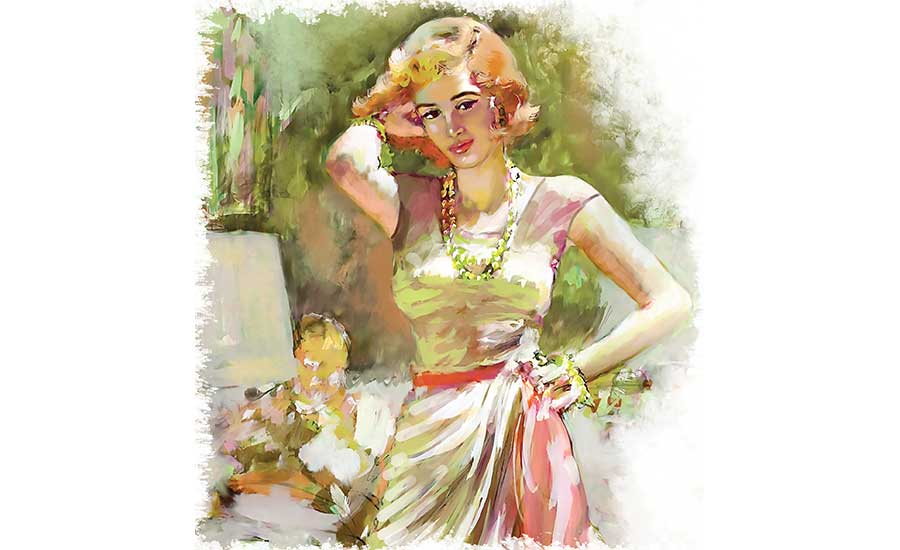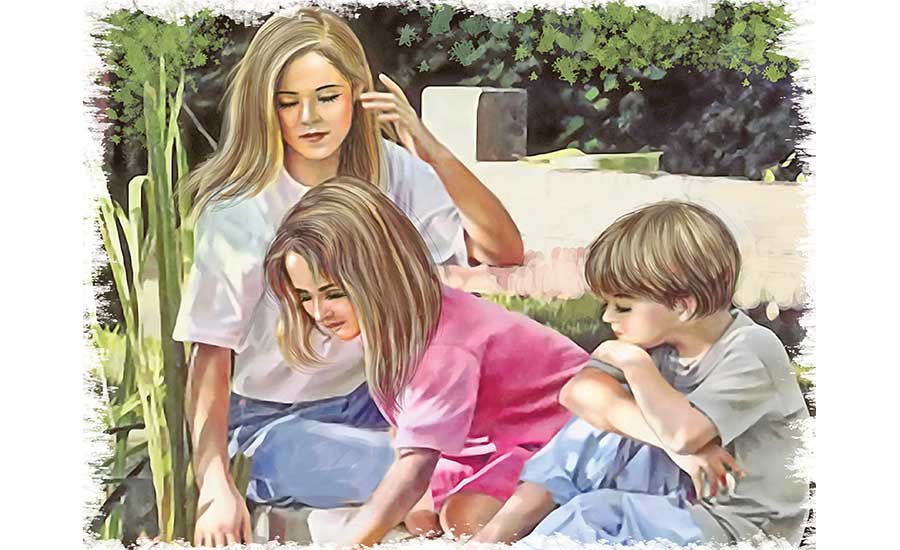An Epidemic
- 13 Apr - 19 Apr, 2024

She can take her mother's spy-glass and have that, too, till she's sick to death of it. You go along, Oliver, and catch the colt. He looked at her very kindly, gratefully, too, perhaps, and turned away toward the live-oak field. But Isabel, hurrying homeward, stopped and called him.
"Oliver, you say your mother's gone?"
"Yes."
"She laid your things out?"
"No, I guess not. I told her I wasn’t going."
"Well, I'll see to it as I run along."
Laying out the things of the men folks of the family was rigidly observed in this household, where Oliver was regarded as the cherished head. He had been brought up to a helpless lack of acquaintance with his best clothes. He knew them only as lending apt to constrict him a little when he got them on, and to rouse in his mother a tendency to make unwelcome remarks about his personal charms. Where they lived, between those times of warfare, he scarcely knew.
Isabel laughed a little to herself, in a rueful fashion, as she hurried along the road. Her own swain was waiting for her, but not for that would she abjure the quest. She ran up Oliver's driveway and, without pausing, opened the blind where the key, she knew, was hidden, and snatched it forth. She unlocked the door and crossed the kitchen, rigid in its order, with Oliver's cold luncheon set out on the table under wire covers. She made her way upstairs, and in his room, also in beautiful array, stood for a moment looking about her. Isabel gave a little laugh. "I should think I was crazy," she said to herself; and then she opened bureau drawers until she found the careful display of bosomed shirts she knew were there. She laid one on the bed, his collar and necktie beside it, and took down his best suit from the closet. She gave the collar of the coat a little unnecessary brush with her hand. It seemed almost a wifely touch, and she was angry with herself. Yet it was only that this was the time, and the tender and the maternal strove blindly in her, and brought forth a largess great enough to touch other lots besides her own.
Then she sped downstairs and went away to her own home. Her mother – a little woman, all energy – met her at the gate. She had on her best bonnet and carried her Paisley shawl. She was shading her eyes with her hand and looking tense in a way Isabel declaimed against, for it made wrinkles in her mother's nice forehead.
"For mercy sake, where you been?" she called.
"Haven’t you seen Jim?"
"No," said Isabel lightly.
"Where is he?"
"Well, I don’t know where he is," said her mother reprovingly.
"He came here after you, all dressed up, and I told him you were gone down to Ellen's to carry the cake. So he said he'd go along down and fetch you up, and I told him he better stop to Ardelia's and see if you wasn't there. And then he come back, riding like the wind, and he said I could tell you Miss' Drake said you’d going' to the picnic with Oliver. She saw you through the spy-glass, and Oliver was gone to ketch the colt."
"There's father," said Isabel steadily.
"He's driving' out the carriage-house now. You got the cake in the buggy?"
"You do worry me 'most to death," said Mrs. Wilde. Her face had tied itself into a snarl of knots, from which the kindly eyes looked angrily.
"Who you going with, Isabel? You aren’t been and took up with Oliver again, after all's said
an' done?"
Isabel laughed, but her voice shook a little, and not with mirth. "I'm all right, mother. Don't you say anything to anybody. That's all. Here comes father. Take care of your dress. You'll get wheel-grease on it."
Her strong hands were lifting the little creature, and Mrs Wilde found herself driven away. She was turning a glance over her shoulder to the last, and calling, "Isabel, you tell me…"

But father, who had Isabel's masterful purpose, whipped up, and they were gone. Isabel, still smiling, as if the sun itself could judge her and it was desirable to keep up some appearance before it, went into the house and closed the door behind her. She took off her hat and hung it on its nail in the front hall. Then her muscles seemed to weaken in a strange way, and she went into the darkened parlor where no neighbour would find her, and sat down by the centre-table. She bowed her head upon the great picture-Bible, and unmindful of the cross and anchor in perforated paper below and the green wool mat with its glass beads, began to cry. Isabel hated tears with a fiery scorn. She liked to stand on her two feet and face the world as her father did; yet here she was, sobbing over the centre table and drawing quick breaths of misery.
Even then, in the passion of her grief, it did occur to her that in all the anger she had felt toward Oliver in times past, she had never wanted to cry. Something now had hurt a deeper heart than she knew she had. She had got over the first tempest of her grief, and sat drying her eyes with a wondering shame, and suddenly there was a sound of a horse driven rapidly. Hope flooded her face with colour. She sprang up and slipped to the window and peered out at the side of the curtain. But it was not he. It was Oliver, handsome in his best clothes, and Ardelia beside him.
Oliver glanced up at the house as they went by; but he bent to Ardelia again in a way that looked fondness and protection at once. And Ardelia was openly in paradise. She was looking up to him with no eyes for any face at the window, and as they whirled out of sight Isabel saw her lift a hand and with a pretty motion brush something from his coat. Then they were gone, and immediately the neighbourhood seemed to settle into a quiet. All the town was at Poole's Woods, and Isabel was left behind.
For a long time, it seemed to her, she sat there, trying to still her breath and school herself into her old serenity. Then she went to the glass that even in the darkened light showed her a miserable look, made a little face at herself, and walked out into the kitchen. There she stood idly for a moment, debating what she should do. Jim Bryant had not lived long in the town, but she knew him well from these few weeks of knowing him. He was tempestuously devoted to her, in a way that stirred her heart. There was plenty of fire and passion in him; he had a temper, and he would not come back. Isabel set her lips. "I guess," she said to herself, "I'll have the burn fire."
She thought of baking pound-cake, but all the day before they had made cake for the picnic. She might wash the blankets, or begin quilting, or clean the cistern. These dramas were hardly exciting enough. The bonfire was better. She tied on her father's hat and kilted her skirts. Then she brought out the iron rake from the barn and settled the brush heap anew. It was on the square of land where she had her perennial bed for three years, and now she had decided to sow it down to grass. The litter of the garden was there, with splinters of shingle and dried weeds, and next week her father meant to burn it. Isabel touched her match and stood by, watching, while the flames curled and crept. Then they crackled among the brush, and she held them down and got excited over it, and for an instant forgot Poole's Woods. It was a good little fight out-of-doors in the hot sun, with a stream of fire when it caught something dry, and then a column of smoke that made a tang in the air and stirred her blood deliciously.
Isabel was like a creature of the earth combating something for the earth's good, and getting hotter and more breathless every minute.
"What you doing there?" called a voice from the gate. She forgot the bonfire, remembering her father's hat and her kilted skirts. Jim Bryant threw the gate shut with a clang and came striding across the yard. He was tall and brown and sturdy. Isabel knew exactly how he looked with his brow set and his blue eyes blazing.
"I've got a burn fire," she said, and raked the harder. Jim came up and took the rake out of her hand. It seemed to be for no purpose save that he had to do something. Isabel put up her head and looked at him. There was hostility in her glance, but it was the challenge for her that meets and measures.
"I see the smoke coming up over this way, and I thought there was the devil to pay," he said harshly.
"What you carrying on like this for?"
"I am not carrying' on," said Isabel, from tense lips.
"This is our land, and I guess I can have a burn fire if I want to."
"Why aren’t you at Poole's Woods?"
The fire was dying down a little, but one persistent flame moved like a snake in the dry stubble, and he savagely stamped it out.
"Why aren’t you? I come
after you."
"You didn't wait, did you?" "Old Miss Drake said you were going with Briggs."
"Did I tell you so?" He weakened a little.
"N-no! But she said you'd been down talking it over and Oliver had gone to ketch the colt. She offered me the spy-glass."
Isabel's lips had a little line of white about them. She looked full at him now.
"Did you take it, Jim?"
"Take it? No!" he roared at her.
"Do you think I'd do a thing
like that?"
They stood looking at each other, glance holding glance, their eyes blazing. Suddenly he threw the rake as if he had been throwing down a shield and held out his arms to her. Isabel walked into them, and while they saw each other, her father's straw hat slipped back over her shoulders, and she laughed and never missed the fluffy headgear lying in her room upstairs, waiting for Poole's Woods. Suddenly she remembered that they were out in the broad sunlight, in sight of the road, and then she bethought her that the entire town had gone to Poole's Woods to leave them in the world alone together. She remembered, too, that old Mrs Drake's spy-glass might be trained on them at that moment.

"I don't care," she said, and laughed.
"Don't care for what?" she asked him.
"For anything. There! Let me go. Here's some more fire in the grass."
They stamped and raked quite soberly for a moment, and then Isabel began to laugh again. She looked wild and beautiful in her fight with the earth and her own heart. Jim laughed a little, too.
"What is it, Bell?" he asked.
"I don't know," she said, in the ecstasy of happiness.
"I guess I like a burn fire." When it died still lower, they walked toward the house, hand in hand, and sat there on the steps watching it.
"Well," said Bryant, smiling at her, "you want to go to Poole's Woods?" Isabel smiled back.
"I guess so," she said.
"We can be there by luncheon-time."
"All right. I'll go home an' harness up." Half-way down the path he stopped and turned.
"Say, Isabel!" She answered from the porch on her way in to don the muslin dress.
"What is it?" "You never told me what you were down there for."
"Where?" "Down to Oliver's." She shook her head and laughed.
"No, nor I shouldn’t, either." His brows were coming together.
"'There was an errand," she called to him.
"It wasn’t mine, either. You got to know?"
Again they stood looking at each other, this time with a steady challenge as if more things were decided than the moment's victory. Then suddenly, as if in the same breath, they smiled again, and Bryant gave her a little nod.
"Take your things along," he called. "We're going to Poole's Woods. That's all I want to know."
COMMENTS